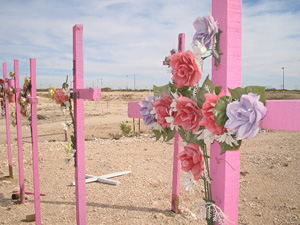 |
 |
 |
 Editorials | At Issue | July 2006 Editorials | At Issue | July 2006  
Femicides are Part of Culture
 El Universal El Universal


| "For more than a decade, the cities of Chihuahua and Juarez, near the US-Mexico border, have been killing fields for young women, the site of over 400 unsolved femicides. Despite the horrific nature of these crimes, authorities at all levels exhibit indifference, and there is strong evidence that some officials may be involved. Impunity and corruption has permitted the criminals, whoever they are, to continue committing these acts, knowing there will be no consequences."
- from MexicoSolidarity.org |
The percentage of females among victims of murder is alarmingly high in Mexico and is the result of "a culture and patterns of conduct that affect the entire nation," says the country´s special prosecutor for violence against women.

In an interview with EFE, prosecutor Alicia Elena Pérez Duarte said 6,000 women were slain last year in this nation of 100 million inhabitants.

The more than 400 "femicides" reported since 1993 in the northern border metropolis of Ciudad Juárez have drawn international attention and provided much of the impetus for the creation early this year of the post Pérez Duarte now holds.

This year has witnessed additional high-profile examples of violence against women, including widely credited claims that police sexually assaulted a number of women in the course of brutally putting down a campesino uprising two months ago in San Salvador Atenco, near Mexico City.

And just last week, 30 armed men burst into a bar in a town in Coahuila and raped 14 female patrons. Pérez Duarte said Wednesday the federal Attorney General´s Office was still trying to figure out if those assailants - some clad in military garb - were Army troops or drug-cartel gunmen.

The special prosecutor said the statistic of 6,000 murders of women in 2005 emerged from a study carried out by a committee of the lower house of Congress.

That figure would represent about 30 percent of all murders in Mexico. For purposes of comparison, in the United States about 20 percent of victims of murder are female.

Regarding the murders in Juárez, she estimated that two-thirds of them were rooted in domestic violence, with the remainder arising from a variety of situations outside of family life.

Yet all of the slayings, according to Pérez Duarte, reflect the "chilling and devastating" misogyny that permeates Mexican society.

"They are murders of women (committed) with hatred because they are women. How can we document that it´s with hatred? Because there is brutality in the way they´re killed," she said.

"It´s not a stray bullet or being run over; they´re women who are tied-up, burned," the prosecutor said.

"Women come to think that this is about situations far different from theirs," she said, but added that three of every five Mexican women and girls experience some kind of violence within the family.

"The issue of violence against women is a national matter because it has to do with a culture and patterns of conduct that affect the entire nation," said Pérez Duarte, whose office works with local prosecutors in the 31 states and the Federal District but also accepts cases brought directly by citizens.

JUSTICE IS SLOW

She described the formation of a cadre of experts in dealing with crimes against women as one of her office´s main tasks and said that since February, more than 300 prosecutors, investigators and forensic technicians have undergone specialized training in the field.

Pérez Duarte said her operation aims to assist victims through a comprehensive approach that included providing medical and psychological services as well as help in pursuing charges against assailants.

She acknowledged that the wheels of justice turn slowly in Mexico, due to the complexity of police and judicial processes and to the efforts by perpetrators to slow or obstruct investigations.

"Gender violence is an abusive exercise of power," the prosecutor said. "In general, we women who work for the betterment of women´s condition are pressured on all sides because (some) want to maintain a status quo that is contrary to the liberties for which we are struggling."

In an effort to attack the root causes of gender violence, Pérez Duarte´s office sponsors a program to teach young men how to resolve differences though dialogue rather than blows.

She says Mexico does not need to impose tougher penalties on perpetrators of violence against women, noting that rapists already face up to 14 years in prison and murderers, a maximum of 50, while battery that doesn´t cause permanent injury can land a man behind bars for six months. There is no capital punishment here.

Pérez Duarte says murders of woman will continue because they are part of "this culture we fight, and we won´t be able to end it overnight through the existence of special prosecutors."

At the same time, she speaks of progress in the infamous Juárez killings, pointing to 117 convictions so far in connection with the 400 crimes. | 
 | |
 |



